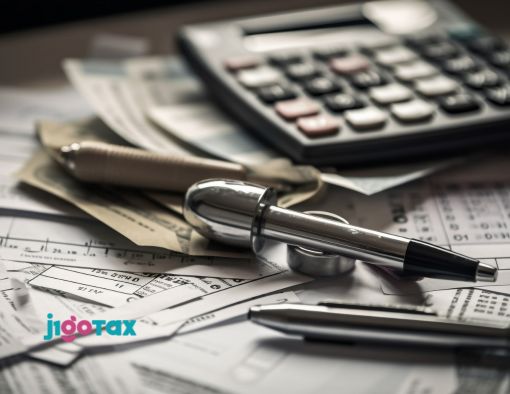3 Reasons Your J-1 Tax Refund Is Delayed
Waiting for your J-1 visa tax refund can feel like forever — especially when you’re depending on that refund to cover expenses. Even after you file correctly, delays are common. But not all reasons are mysterious. In many cases, they stem from avoidable issues: identity verification holds, simple errors, or IRS freezes for review.
In this article, we’ll walk you through the top 3 reasons your J-1 tax refund might be delayed, what those hold-ups really mean, and what steps you can take to help speed things up. We’ll also weave in critical documents you should always check (W-2, 1042-S, DS-2019, transcripts, SSN/ITIN) and when the difference between Form 1040NR vs Form 1040 matters for your refund.

The Tax Moves Blog

👉 If you’re unsure which form to file, read our detailed comparison: Form 1040 vs 1040NR for J-1 visa holders.
Reason #1: Identity Verification Delays / Fraud Holds
One of the most common and frustrating causes of a refund delay is the IRS withholding processing for identity verification. This happens when the IRS’s systems flag your return for possible fraud or identity theft, and it needs extra confirmation before releasing a refund.
-
Letters 5071C or 4883C are common in such cases. These notices ask you to verify your identity and tax return before proceeding. Taxpayer Advocate Service+3IRS+3Taxpayer Advocate Service+3
-
Until you complete the verification, your refund remains in limbo. Claimyr+4Taxpayer Advocate Service+4IRS+4
-
The IRS expects that once verification is done, processing will resume — but the wait can be weeks or even up to 9+ weeks in some cases. Taxes for Expats+3IRS+3Claimyr+3
What to do:
-
Respond immediately to any identity verification letter (5071C/4883C) following the exact steps (online, call, upload ID). IRS+1
-
Monitor your IRS transcript for codes like 570 (delay) or 971 (processing hold) after the request. Taxpayer Advocate Service
-
Be patient. After verification is accepted, refunds may take 9 to 21 days to resume normal processing. Claimyr+1
Reason #2: Errors, Incomplete Returns, or Mismatches
Another major reason your refund is delayed is that the IRS found issues in your return — errors, missing information, or data mismatch with what third parties reported.
-
The IRS lists errors, incomplete returns, or identity/fraud flags as top delay causes. IRS
-
For example, SSN/name mismatches, missing signatures, incorrect bank account numbers for direct deposit, or mathematical mistakes can immediately flag a delay. TaxAct+3TurboTax+3IRS+3
-
If your return is incomplete or contradictory, the IRS may send a letter asking for corrections or additional documentation. IRS+1
-
If you file on paper rather than e-filing, expect a slower timeline by default due to manual data entry. TurboTax+1
What to do:
-
Double-check every detail before submitting: W-2, 1042-S, SSN/ITIN, bank routing, signatures.
-
Use your IRS transcript before filing to confirm what the IRS has already received matches your return.
-
If errors are identified later, respond promptly to IRS correspondence.
-
Always e-file if possible and opt for direct deposit — it’s the fastest route to a refund. IRS+1
Reason #3: IRS Review / Refund Freeze / Refund Applied to Other Debts
Sometimes your refund is delayed not because of your fault, but because the IRS is holding it for internal review (a “freeze”) or applying it to outstanding debts.
-
The IRS may freeze a refund temporarily to verify possible fraud, duplicated returns, or unusual claims. This is commonly called a refund freeze. Taxes for Expats+2IRS+2
-
Refunds may be offset to pay other obligations such as back taxes, child support, or student loans. The IRS will notify you if that’s the case. Taxpayer Advocate Service+1
-
Budget constraints and increased fraud detection measures also slow processing for many returns. TaxAct+2Taxes for Expats+2
What to do:
-
Check your transcript and watch for hold codes (e.g. “refund frozen,” “review hold”).
-
Use Where’s My Refund tool and IRS online account for status updates. Taxpayer Advocate Service+1
-
If your refund is offset, you’ll receive a notice. Review it and compare to any debts you might owe.
-
If the delay is severe, you may contact the IRS Taxpayer Advocate Service for help.
Tie to J-1 Specialty: Documents & Form 1040NR vs 1040
For J-1 visa holders, these delays become more critical because of the specialized nature of your returns:
-
If you mistakenly file Form 1040 instead of Form 1040NR, IRS systems can flag your return for review. (See our guide: 1040 vs 1040NR)
-
Any mismatch in DS-2019, incorrect treaty claim, or incorrect 1042-S treatment can trigger scrutiny.
-
Identity verification delays hurt J-1 applicants more because IRS must confirm your status and your documents before releasing a refund.
-
Ensure all your documents (W-2, 1042-S, transcripts, SSN/ITIN) are accurate and consistent — these are your defense if your refund gets held.

Delays are frustrating, but most are solvable. To recap:
-
Verify your identity immediately if requested (Letters 5071C, 4883C).
-
Double-check every form and avoid mismatches between W-2, 1042-S, and your return.
-
Use your IRS transcript to monitor progress and understand any codes or holds.
-
Always file Form 1040NR — the correct nonresident form for J-1 visa holders.
⚡ File with Confidence — Use J1 Go Tax
If you’re a J-1 visa holder and your refund is delayed (or you just want to make sure it never happens again), J1 Go Tax can help.
We specialize exclusively in J-1 visa taxes — ensuring your return is filed correctly using Form 1040NR, with all your documents (W-2, 1042-S, DS-2019, Form 8843) properly included.
✅ No charge if you don’t get a refund.
✅ 100% focus on J-1 visa holders.
✅ Proven record — every refund successfully received.
Start here: J-1 Visa Tax Return Guide or use our J-1 Tax Calculator to see your potential refund instantly.
Core Guides & Calculators
1. Learn everything about J1 visa taxes — our complete 2026 step-by-step guide for nonresident workers with W-2 income.
2. Estimate your refund instantly with our J1 visa tax calculator — no signup required.
3. Compare Form 1040 vs 1040NR for J1 visa holders and find out which one applies to you.
4. Understand the importance of your DS-2019 form — it defines your program, tax status, and eligibility.
Forms & Tax Documents
5. Did you receive a 1099 instead of a W-2? Here’s what to do — Form 1099 for J1 visa workers explained.
6. Learn how to apply for your SSN or ITIN as a J1 visa holder before filing your taxes.
7. Understand your IRS transcripts for J1 visa taxes — what they show and how to request them.
8. Received a Form 1042-S? Discover what it means and how to include it in your tax return.
9. Find your Form W-2 for J1 visa — and learn what each box means when you file.
10. File correctly using the official Form 1040NR for J1 visa holders — step-by-step.
11. Don’t forget your Form 8843 — it’s mandatory even if you had no income.
12. Check this J1 visa tax return example using Form 1040NR to understand how everything fits together.
Special Cases & IRS Resources
13. Missed the April deadline? Learn how to file J1 visa taxes after April and still get your refund.
14. Review official IRS guidance on Taxation of J-1 visa holders and resident status.
You may also like
Do J-1 Visa Holders Pay State Taxes? A State-by-State overview
Do J-1 Visa Holders Pay State Taxes?Yes. J-1 visa holders generally must pay federal and state income tax on U.S.-source income. State rules differ: some tax any income earned in the state (nonresident sourcing), some tax residents on worldwide income, and a few states have no personal income tax at…
Substantial Presence Test for J-1 Visa Taxes – 1040NR or 1040 Explained
Substantial Presence Test for J-1 Visa Taxes: Resident vs Nonresident StatusThe Substantial Presence Test J-1 Visa Taxes is the IRS rule that determines whether a J-1 visa holder is classified as a nonresident alien or resident alien for U.S. tax purposes.This classification directly affects which tax form you must file…
J-1 Visa Taxes in Orlando – Guide for W-2 Workers Only
J-1 Visa Taxes in Orlando: What You Should KnowOrlando, Florida, hosts thousands of J-1 exchange visitors with Form W-2 income only, especially through programs connected to theme parks, hospitality, tourism, hotels, restaurants, retail, and cultural exchange organizations across Central Florida. Most employers in Orlando pay J-1 workers through standard W-2…
IRS Announces First Day of 2026 Tax Season – Filing Dates & Tools
IRS Announces First Day of the 2026 Tax SeasonThe Internal Revenue Service (IRS) has officially announced that January 26, 2026 will be the first day of the 2026 tax filing season. Starting on this date, the IRS will begin accepting federal tax returns for the 2025 tax year. This announcement…
J-1 Visa Taxes in South Bay – Guide for W-2 Workers Only
J-1 Visa Taxes in South Bay: What You Should KnowSouth Bay, including areas such as Torrance, Redondo Beach, Manhattan Beach, Hermosa Beach, Hawthorne, and El Segundo, hosts many J-1 exchange visitors with Form W-2 income only. Participants commonly work in hospitality, tourism, aviation, technology support, universities, retail, and service industries…
J-1 Visa Taxes in Long Beach – Guide for W-2 Workers Only
J-1 Visa Taxes in Long Beach: What You Should KnowLong Beach, California, hosts thousands of J-1 exchange visitors with Form W-2 income only, particularly through programs connected to ports and logistics, hospitality, tourism, universities, healthcare facilities, retail, and service industries across Los Angeles County. Most employers in Long Beach pay…
J-1 Visa Taxes Central Valley – W-2 Workers Only
J-1 Visa Taxes in Central Valley: What You Should KnowCalifornia’s Central Valley is home to a large number of J-1 exchange visitors with Form W-2 income only. Each year, non-resident workers are employed across agriculture support services, food processing, logistics, hospitality, education programs, healthcare assistance, and seasonal operations in cities…
J-1 Visa Taxes in Fresno – Guide for W-2 Workers Only
J-1 Visa Taxes in Fresno: What You Should KnowFresno and California’s Central Valley host a significant number of J-1 exchange visitors with Form W-2 income only each year. Participants work mainly in agriculture support services, food processing, hospitality, education programs, healthcare assistance, cultural exchange roles, and seasonal employment across Fresno…
J-1 Visa Taxes in Ventura, CA: What You Should Know
J-1 Visa Taxes in Ventura: What You Should KnowVentura and the surrounding coastal areas host a steady population of J-1 exchange visitors with Form W-2 income only each year. Participants are employed mainly in hospitality, coastal tourism, restaurants, seasonal services, agriculture support roles, cultural exchange programs, and education-related employers across…
J-1 Visa Taxes in Santa Bárbara – Guide for W-2 Workers Only
J-1 Visa Taxes in Santa Bárbara: What You Should KnowSanta Bárbara and the Central Coast welcome thousands of J-1 exchange visitors employed by beach resorts, university programs, seasonal tourism businesses, and healthcare training centers with Form W-2 income only each year. Most employers in Santa Bárbara pay J-1 participants through…









